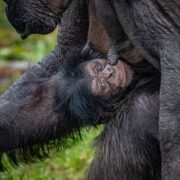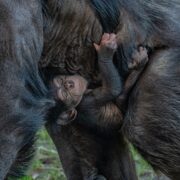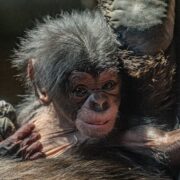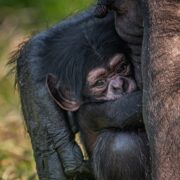Our chimps are part of a vital international conservation breeding programme, so we’re absolutely delighted to welcome a rare new addition to the chimpanzee family at Chester Zoo!
The new male infant arrived to mum Alice in front of astonished zoo visitors on 29 December 2023 at 1:40pm following an eight-month pregnancy.
Our photographers have captured a series of photos of the precious newborn, showing it being carefully cradled by mum and other female relatives in the 21-strong group.
The chimpanzees at the zoo are part of an international conservation breeding programme which sees European zoos working together, using the latest scientific technologies to determine the genetic makeup of each chimpanzee, to create a safety-net population to help prevent the primates from disappearing altogether.
Human-related activities such as the illegal wildlife trade and poaching have severely impacted chimpanzee populations in many parts of Africa. Deforestation, driven by agricultural expansion and logging, has significantly reduced their natural habitats into smaller and more fragmented territories.
“A new birth always sparks some real excitement within the chimpanzee group here at Chester. While Alice and her new baby are certainly centre of attention among the other chimpanzees they’re still finding some quiet time to get to know one another and can often be seen cuddled up together.”
Mike Jordan, our Animal & Plant Director at the zoo.
Mike continued: “What’s also great to see is that some of the others in the group, especially the younger females, are really intrigued by the new baby and are learning all about motherhood from Alice.
“This is an important learning curve for them and this experience can be really useful for when they hopefully go on to have babies of their own. A thriving conservation breeding programme is key to the long-term protection of these animals.
“For nearly 30 years our teams have worked on the ground in Uganda, Nigeria and Gabon in Africa, working hand in hand with wildlife authorities, in-country partners and local communities in an effort protect some of the world’s rarest wild chimpanzee populations and their forest homes. These collective efforts, paired with the conservation breeding programme in zoos, gives us hope that we can create a future where chimpanzees thrive long into the future.”
Over the last few years we’ve been working closely with the Uganda Wildlife Authority, pioneering camera trapping techniques targeted at giant pangolin in several sites across Uganda. These surveys also provide valuable information on a range of species, and the eastern chimpanzee (Pan troglodytes schweinfurthii) occurs frequently as a flagship species in several survey areas.
Our initial biodiversity surveys on selected sites of coastal forest around the Fernan Vaz lagoon have shown significant populations of threatened species such as central chimpanzees (Pan troglodytes troglodytes), western lowland gorillas and forest elephants. Future activities will include working with communities and local agencies to implement plans for these highly important areas of unprotected forest.
The Nigeria-Cameroon chimpanzee (Pan troglodytes ellioti) is the most threatened chimp subspecies. Through the Gashaka Primate Project, and later the Gashaka Biodiversity Project, Chester Zoo have been a major partner protecting one of the most significant populations of this chimp subspecies in Gashaka-Gumti National Park.
Adopt a chimpanzee
Chimpanzees are critically endangered. Whether you buy an adoption for yourself or as a gift you’ll be making a vital contribution to help wildlife thrive around the world.
Become a member
Don’t miss a thing this year, become a member and watch our new baby arrivals grow with UNLIMITED access to the zoo. Plus, join today and save 10% when you sign up to renew by Direct Debit.



